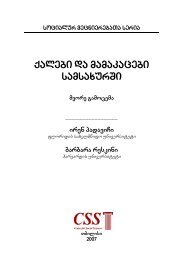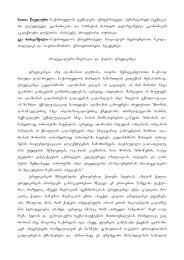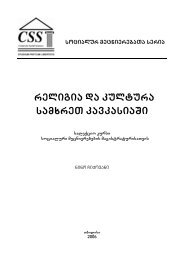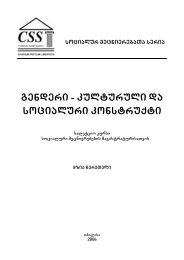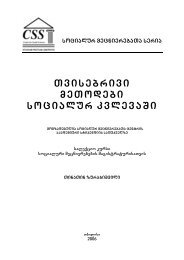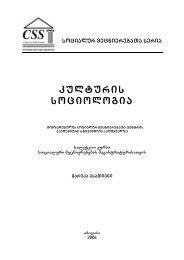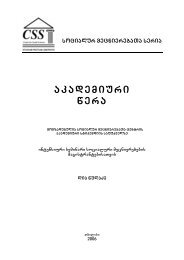kultura da modernizacia - Center for Social Sciences
kultura da modernizacia - Center for Social Sciences
kultura da modernizacia - Center for Social Sciences
You also want an ePaper? Increase the reach of your titles
YUMPU automatically turns print PDFs into web optimized ePapers that Google loves.
CULTURE AND MODERNIZATION<br />
TOPIC 1. BASIC CONCEPTS AND TERMS<br />
Summary<br />
Ivane Tsereteli<br />
Ketevan Kakitelashvili<br />
The first topic aims to interpret the basic concepts and terms, which will be used in the<br />
framework of the course. These terms deal with the problems and description of developments,<br />
which are connected with the process of modernization in different regions, thus in different cultural<br />
spaces. The problems of intercultural contacts and its various <strong>for</strong>ms (assimilation, confrontation,<br />
symbiosis, synthesis, cultural conflict, cultural shock, diffusion), the role and place of tradition in the<br />
process of modernization, problems of interconnection of tradition and modernization, the question<br />
of identity in non-Western cultures in the light of significant changes accompanied with<br />
modernization shall be discussed through the course.<br />
As the process of modernization has arisen and developed on two levels, that are culture and<br />
civilization, it is necessary to define these two phenomena. The study and analysis of these<br />
processes should be based on these concepts.<br />
As the phenomenon of culture is concerned, its two aspects must be mentioned:<br />
1. Culture, as an universal determinant of humanity;<br />
2. Culture, as the basis of differences and borders between distinct societies.<br />
According to the first approach, culture is a result of an unique ability of Homo Sapiens –<br />
biological and social being. This factor differs humans from other biological kinds.<br />
Man is genetically (biologically) determined to create, reproduce and transmit culture.<br />
Realization of these unique abilities is possible only during the social practice, in connection with<br />
experience of preceding generations, together with the process of socialization.<br />
Apart from this, culture is represented as a complex of values, patterns of behavior and<br />
stan<strong>da</strong>rds, which regulate people’s interrelations and their attitudes towards the nature and society.<br />
Thus, culture is a complex of social heritage, providing the succession of social experience.<br />
The second aspect of culture implies that man’s ability to create and to pass culture is realized<br />
differently in particular societies. These differences are caused by specific conditions of<br />
development and the history of the concrete social group. Hence, we can speak about the peculiar<br />
models of the world, each created by separate culture.<br />
Culture is the main characteristic, by means of which the representatives of diverse societies<br />
differentiate themselves from others.<br />
Thus, culture can be defined as:<br />
• Determinant of social behavior;<br />
• Determinant of individual knowledge and interpretations;<br />
• Mechanism of self-identification;<br />
• Regulator of social life;<br />
• Translator of social experience;<br />
• A<strong>da</strong>ptation mechanism.<br />
111



